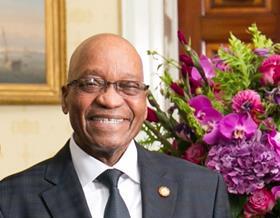
In recent years South Africa, once the pride of Nelson Mandela and the darling of the world because of its peaceful transformation from Apartheid to Democracy, has been stumbling from one incident of corruption to another.
This all happened under the watch of the President, Jacob Zuma, who has more than 700 charges of corruption hanging over his head. Zuma is, however, a slippery chap and has been frustrating efforts to bring him to court.
The economy has declined to the extent that the three most important rating agencies in the world have downgraded South Africa to below investment status. Zuma has been fighting from one court case to the other and has been found by the highest court in the country to be in breach of his constitutional duties.
Steadily, over time, other political parties and even parts of the governing party, have turned on Zuma. He just survived a no-confidence debate in parliament, a select committee of parliament is ruthlessly investigating his, and other government ministers’ roles in the capture of the state, and the High Court has ordered the man who has been keeping the President from facing the music in court, Public Prosecutor Shaun Abrahams, to vacate his position.
Through all this the South African fruit export industry has been steaming ahead, exporting record levels of citrus and table grapes in the past season.
The declining South African currency, all because of the actions of Zuma and his colleagues, has boosted returns to incredible levels.
These fruit growers will be watching the coming leadership contest with great interest. They know they cannot rely on a weak currency indefinitely and that stability of the local economy will be paramount for future growth.
In the ring are the vice-president Cyril Ramaphosa, a well-known businessman and the lead negotiator when the Democratic Government was formed, as well as Zuma’s ex-wife, Nkosazana Dlamini-Zuma, who recently headed up the African Union.
Zuma is hoping that Dlamini-Zuma will win, not only becoming the country’s first women president, but also because he believes she will save his bacon and keep him out of jail.
Should this happen it is almost certain that there will be a further downgrade and the South African currency could go into free-fall.
In the short-term this will boost the coffers of the stonefruit and table grape growers who are now moving into their peak season, but there will be little joy or satisfaction about that outcome.
Ramaphosa is reported to be leading, but in the stumbling and unstable ANC, anything can happen. It will be a secret vote and in an environment of non-existent integrity, delegates can make a lot of money from agreeing to vote for one delegate or the other.
Should Ramaphosa win, most people believe that there will be a turn for the better. If Dlamini-Zuma wins, it is likely that the ANC will split down the middle and probably lose power in the next election in 2019.
Zuma hopes to remain president until then, if he can stay out of jail. Some analysts say that whoever wins, Zuma’s time is over. He is likely to be ‘recalled’, which is the polite word use when the ANC wants to fire someone. If he resists these moves, he could be impeached. This is something he will want to avoid, because he will lose all his benefits and go home to his home village in Zululand, penniless.
From fruit growers to ordinary citizens, there is a general feeling that things cannot continue as it is now. That is why they will probably pray for a Ramaphosa victory and that he should have the courage to act decisively to stop the decline in the country.
What happened in Zimbabwe with the demise of Mugabe could be repeated in South Africa, but hopefully with those who destroyed the country being called to book.



